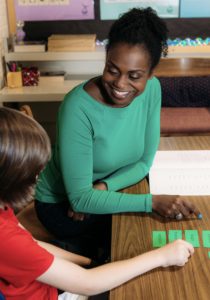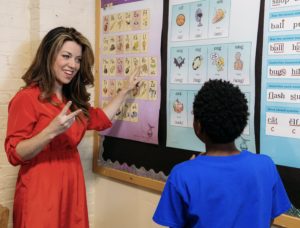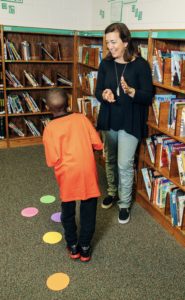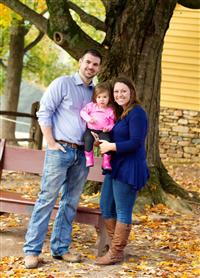Doing Good Things Series: READWS/Augustine Literacy Project
By Kris A. Cox, Director of the Winston-Salem Augustine Literacy Project
Tutor ONE Child. Change TWO Lives. The Winston-Salem Augustine Literacy Project®, a program of READWS has been serving low-income, struggling readers for fifteen years. The Project trains and supports volunteer tutors who provide free, long-term, one-to- one instruction. ALP methodology is based on the research-based Orton-Gillingham approach and uses materials designed by Wilson Language Training Corporation® and ALP. We currently have over 160 tutors working in thirty-five schools.
Orton-Gillingham is a structured, multisensory, phonetic teaching approach that has been proven to work with those who have language based learning differences. Lessons include the five essential components of research-based reading instruction as defined by the National Reading Panel: phonemic awareness, phonics, vocabulary, fluency and comprehension.
 The Need
The Need
- 15-20% of school-aged children have reading problems; among low-income families the percentage is likely higher.
- Children do not outgrow poor reading: 74% of poor readers in 3rd grade are still poor readers in 9th grade. The gap widens over time.
- NAEP scores for 2011: 66% of North Carolina’s 4th graders score below proficient in reading; nationally the figure is 68% (for African American 4th graders in NC, 84% are below proficient; Hispanic students in NC, 80%.)
- 57% of children with learning disabilities leave school without a diploma.
- 85% of all juvenile offenders have a reading difficulty and prison populations include a large percentage of non-readers.
- For 90% of poor readers, early, intensive intervention can increase reading ability to an age-appropriate, average skill level.
Tutor Training/ Class Options
 There are two training options. The first option is a 2-week, 60-hour training class. This is ideal for people who have 2 weeks to take the full training at one time. This training includes 5 practice lessons with guidance from an experienced tutor coach.
There are two training options. The first option is a 2-week, 60-hour training class. This is ideal for people who have 2 weeks to take the full training at one time. This training includes 5 practice lessons with guidance from an experienced tutor coach.
The second training option is a 1-week, 30-hour class that includes pre-reading and small, nightly assignments. The class focuses on the beginning steps, and tutors are encouraged to return for refresher seminars, as they get further along in the teaching sequence. This class includes 2 practice lessons during the training week, and 2 more practice lessons with guidance from an experienced tutor in the week or two following the class.
 No prior tutoring experience is required for either class. In both classes tutors will learn basic skills assessment and tutoring procedures following an Orton-Gillingham approach (using the Augustine lesson plan and Wilson® materials). The course is taught by a team of experienced trainers who present such topics as the definition and characteristics of dyslexia; the essential components of reading instruction; the history and principals of Orton-Gillingham; phonological awareness; the scope and sequence of Orton-Gillingham teaching via Wilson Reading System® materials (including sounds, syllable types, and spelling rules); sight words; plus phonics games and activities.
No prior tutoring experience is required for either class. In both classes tutors will learn basic skills assessment and tutoring procedures following an Orton-Gillingham approach (using the Augustine lesson plan and Wilson® materials). The course is taught by a team of experienced trainers who present such topics as the definition and characteristics of dyslexia; the essential components of reading instruction; the history and principals of Orton-Gillingham; phonological awareness; the scope and sequence of Orton-Gillingham teaching via Wilson Reading System® materials (including sounds, syllable types, and spelling rules); sight words; plus phonics games and activities.
An Augustine Tutor’s Responsibilities
Tutoring usually takes place twice a week at the child’s school during the school day. Each lesson lasts about 45-60 minutes. Tutors may borrow phonetically controlled readers, workbooks and reference materials from the Augustine library. The Project provides tutors with ongoing support and opportunities to share lesson-planning ideas. Also, the Director and support staff is available to support and coach new and returning tutors both in group settings and individually.
 Our Students
Our Students
Teachers, parents and curriculum coordinators refer students to the program. We work with low-income students at any grade level who struggle with reading or written language. We do not require that students meet North Carolina’s 15-point ability/achievement discrepancy to be assigned a tutor.
Honors
In 2013, the Augustine Project-WS received the Lucia Karnes award from the North Carolina International Dyslexia Association. The award is given for Outstanding Volunteer Service that supports the NC-IDA mission. In both 2012 and 2010, the Augustine Project won a grant from the Women’s Fund of Winston-Salem for the Project’s “Literate Girls” Program. In 2009, the Winston-Salem Augustine Project was awarded a North Carolina Award for Outstanding Volunteer Service from the Governor’s office. In past years, the Augustine Project has been honored by the Learning Disabilities Association of North Carolina as the recipient of its statewide Literacy Award. In addition, several tutors have been named Volunteer of the Year at individual schools, and board members have received numerous awards from the NC Branch of the International Dyslexia Association.
 The Future
The Future
The demand for Augustine tutors far outweighs the supply. The knowledge and nurture an Augustine tutor provides can mean the difference between prison and productivity for an at-risk child. This service transforms the lives of both students and tutors.
Come Learn More!
Join us at an upcoming Coffee and Conversation. Please visit our website, https://loveliteracy.org/ or call 723-4391, ext. 1506 to learn more. Be the Spark. Ignite a Reader.
_______________________________________
Check out other “Doing Good Things” blogs here:
“Doing Good Things Series” – H.O.P.E
“Doing Good Things Series”- Empowered Girls of North Carolina
“Doing Good Things Series” – The Speech Bus
“Doing Good Things Series” – Buddy Break
“Doing Good Things Series” – The Robert DeLoach Heroes League
“Doing Good Things Series” – The iCan House
To nominate a non-profit to be featured in our “Doing Good Things” series, email Rachel@triadmomsonmain.com.





























I was really interested in becoming a volunteer until I saw that you had to pay for the training. That seems strange that you have to pay to volunteer. Is there anyway the training fee can be waived?
Awesome organization that my family has the privilege of working with.
What a wonderful organization…you are all definitely doing good things! Thanks for sharing your story on TMoM!